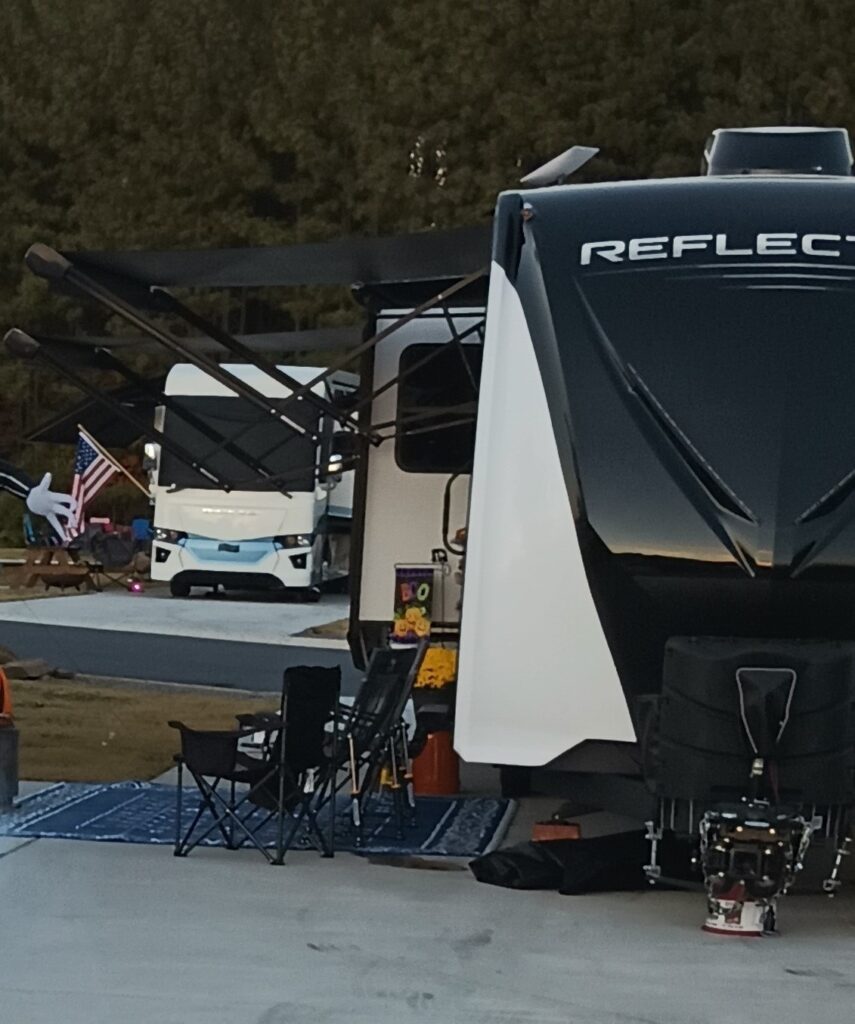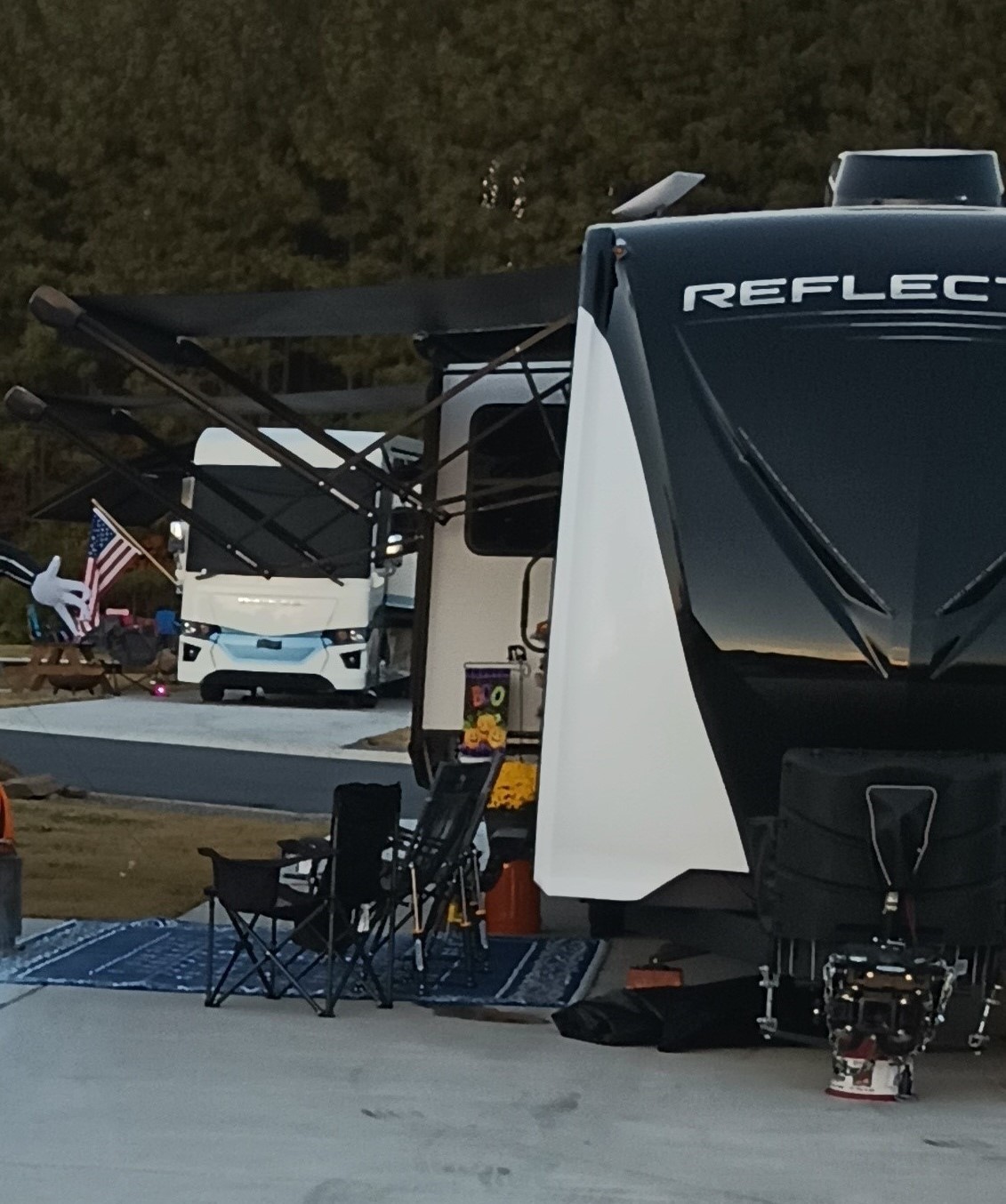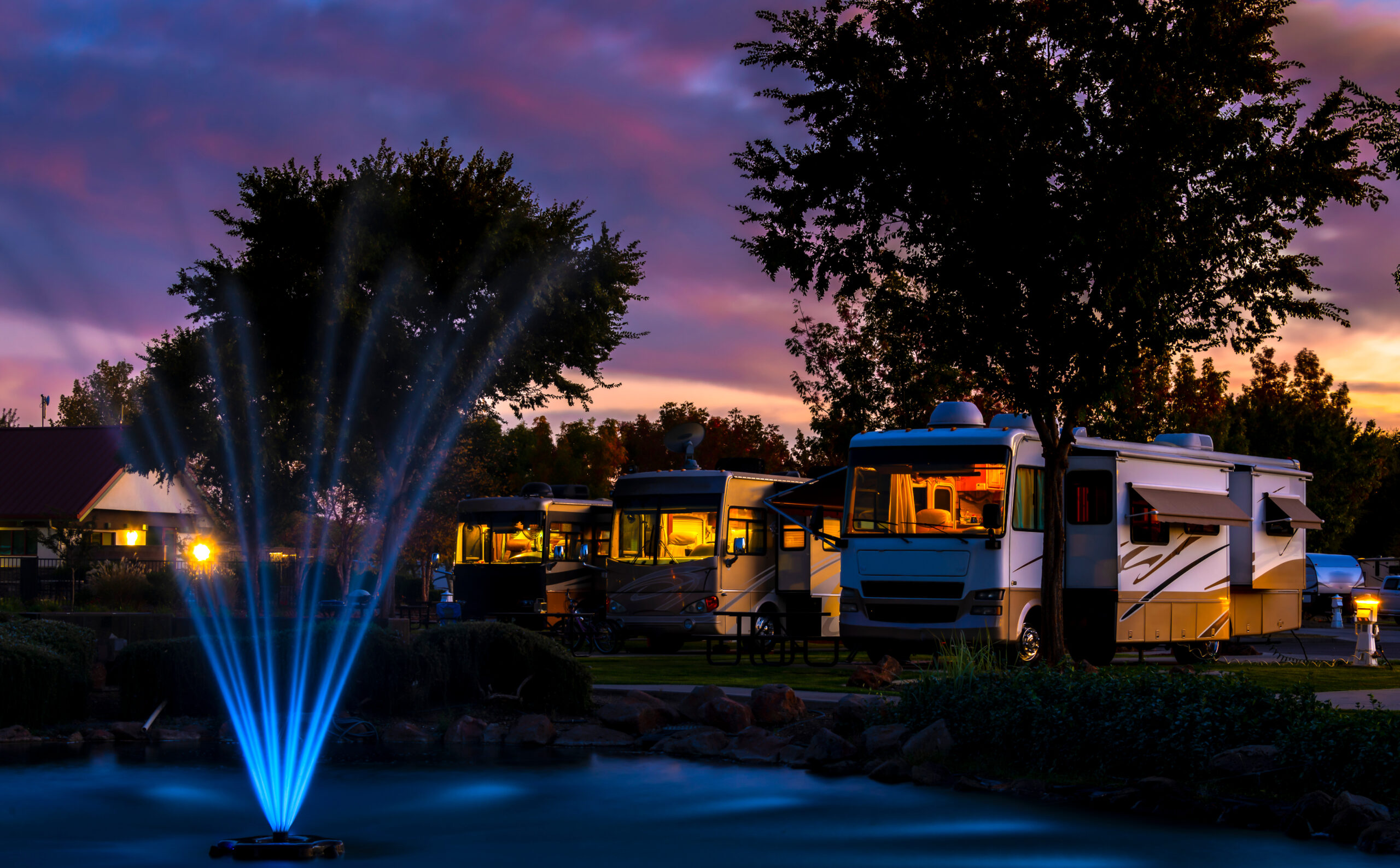
In our travels, we meet a lot of people that are full time RVing. There are also those out there that are thinking about full time or were once full time. We’ve had a lot of discussions with many people and learned a lot of practical tips for this type of RVing. Are you ready to break free and explore the country? Our family has been embracing this adventurous lifestyle for almost 10 years now. Of course, before we set off on our epic trips there were a lot of questions that needed answering. Should we stick around and figure out what to do next Saturday? Should we take off on a new adventure of full time RV living?
Our decision was easy
Well, it didn’t take us too long to decide, time to hit the road as much as we could! We started with a travel trailer (towable, pull behind). After a few years of figuring out what we liked and did not like, we made the jump, and upgraded to a motorhome. We currently go full-time RV living in the summer months every year. Whether you are considering 3, 6, or 12 months out of the year full time RVing this post is for you. So sit back and fasten your seat belts, because there is a lot of information here that we’ve compiled in this blog post for you!
Full time RVing is different for everyone
Are you ready to hit the road and set up your home on wheels? That’s full-time RVing! People from all walks of life — from singles, couples, families young and old (and every budget too) – are free to explore a brand-new way of living. There’s no predetermined path for adventure; you can zip around continuously or stay in favorite spots seasonally – perfect if you want to follow those sunshine rays during summer & ski the of Aspen in the winter. So why wait any longer? Exploring a new destination can be both thrilling and unpredictable. Sure, you should plan ahead with your itinerary but don’t forget to embrace the unexpected wonders that await. It’s it’s often these delightful surprises which make an adventure truly unforgettable!
Are you ready for full time RV living?
If you love a life of travel and adventure, it may be that your blood is running with just the slightest hint of wanderlust or even gypsy spirit! For those who like to keep their feet firmly planted in one place however, this kind of lifestyle might seem untenable. But for some individuals – less attached to material possessions – living an existence full of elegant simplicity on the open road can feel incredibly freeing. With modern conveniences onboard the RVs of today, explorers have everything they need as they joyfully live out each exciting new day exactly where chance leads them next!
Are you ready to ditch the drudgery of regular lawn-mowing and get out there on the open road? Nothing can beat an adventure — from majestic national parks, marvelous new friends at each turn in your journey, to a much more laid-back lifestyle! Knowing what you want makes it easier for all those awesome dreams come true.
 Understand the Nuts & Bolts of RV Living
Understand the Nuts & Bolts of RV Living
It’s essential to understand the basics of what it takes to make full-time RVing a reality. Familiarize yourself with different types of RVs and motor homes, how much storage space they offer and what type of amenities each provides. Research the types of materials used in constructing an RV and plumbing as well as power requirements for different models. Getting to know these basics will help you make educated decisions when you make your purchase. You should also consider expectations such as driving distances, how often you expect to camp at different spots and how long you plan on staying in each place among other factors.
Insurance coverage varies
Make sure your RV is insured and that you understand all the insurance options available for full-time RVers. Insurance rates for full-time RVing can vary greatly depending on several factors such as the type and value of the RV, the driver’s age and driving history, the state of residency, and the level of coverage desired.
Know the risks
Consider all of the potential risks associated with full time travel. While full time rvers don’t typically have to worry about theft or damage to their RV when they’re parked in public places, it’s still important to insure your vehicle for any accidents that may occur while on the road. Most policies offer basic liability coverage that covers property damage and medical expenses incurred by other people in the event of an accident caused by the full timer RVer. There are also additional coverage options available, such as full coverage for personal belongings and liability coverage that covers bodily injury caused by the full time RVer.

You will pay more in insurance for full time RV living
Just get ready to sign the paper for higher insurance rates! Insurance for the full time RV lifestyle has a higher risk of accidents or incidents on the road. This, unfortunately, can lead to higher insurance rates. But never fear! Many providers offer discounts that could help you find coverage at an affordable price. When I look at social media posts about this topic, things are all over the board. Do yourself a favor and research. Shop around to compare different policies, it will pay off in the long run. One last thing – it’s also essential to review and revise your plan regularly as life (and RVs) evolve over time. I like to look at my policies once every six months.
What is a home base and do you need one?
A home base is a full-time RVer’s primary residence. It can be as basic as having an address, mail forwarding service, or banking institution in a certain state or city, while they travel full-time around the country. Depending on your lifestyle and financial situation, you might need a home base to provide more stability; this may involve living in one location for a few months at a time in order to steady expenses such as healthcare, taxes and other costs associated with full-time RVing.

How COVID-19 affected full time RVing
COVID-19 flipped full time RVers into panic mode, especially those who did not have a home base. One of the biggest challenges full time RVers faced was travel restrictions. Different states and cities had different regulations regarding who can travel and under what circumstances. As a result, knowing the regulations and even current post pandemic COVID status before planning a full-time RV trip is essential to staying safe and compliant. The cost of full time RVing has also been impacted by the pandemic. Increased demand for campgrounds and gas prices mean full-time RVers need to budget more carefully than ever before. It’s important to research various destinations ahead of time in order to find the best deals on lodging, supplies, and transportation costs.
Some final thoughts on a home base for full time RVing
Even when life is an adventure and you live by the motto “travel now, ask questions later”, having a reliable home base should be your top priority. You’ll have to pay taxes (unfortunately!), cast your vote, register vehicles – all those little necessities for being part of society! Owning property or living with family members can work as home addresses; otherwise consider settling in some of the more popular states where RVers set up a domicile.
Is full time RVing expensive?
Full time RVing can be an incredibly rewarding experience, full of travel and new experiences. But what does full time RVing cost? Have you ever heard people talking about owning about and the BOAT acronym of break out another thousand? We’ve owned both it this certainly applies to RVs as well! To properly explore this topic, we need to consider a few factors including the type of RV you’re looking for, its size, your lifestyle preferences and more.
Also check out this pot: Buying An RV At A Show
How much do RVs cost?
We’re going to explore RV types and prices in other articles, but the price of an RV will vary significantly based on many factors. It is really important to take the time to understand your needs and budget. In general, full-time RVing can range from $10,000 – $175,000 or more depending on the type of RV you get and how much it is customized to your need. Regardless of whether you buy new or used, in our experience you will likely find something you will want to change, retrofit or upgrade. Additionally, full-time RVers will need to consider other costs we will discuss in this article such as insurance, campground or resort fees and fuel. All in all, there are many ways to experience full time RVing without breaking the bank. With careful planning and research into what fits best for your lifestyle preferences and budget, full time RVing could be an incredibly rewarding journey full of travel and exploration.
As a full time RVer budgeting is important
RV life can be a fantastic way of living, but there’s more than meets the eye when it comes to finances. To make sure your travels don’t put you in financial distress, figure out if your lifestyle fits with a nest egg or income stream that will support this new venture! Crunching those numbers and getting ready for some highway adventure is key – get all set up financially so you have nothing holding you back from enjoying one unforgettable journey and the memories that you will be making.
Figure out your spending
Take the time to assess what you’re spending money on now and where you can start cutting back. From forgoing that daily coffee run, saying goodbye to eating out regularly or simply looking at how much of an impact removing rent/mortgage payments from your budget would be – trimming down is key! It won’t take forever either; do something today so tomorrow you can live small yet large-mindedly.
Think about future expenses
Prepare for your adventure by staying on top of loan payments, insurance costs, and campground fees – which can vary depending on where you are. And while you’re at it, be sure to think ahead about a power source like solar or generator so unexpected delays don’t hold you back from all that exciting exploration. Don’t forget to save some room in your budget for any surprise’s life throws your way; but if money issues arise down the line then just enjoy those beautiful views a little longer instead!
Working while full time RVing
I’ll start with the good news here. If you have a traditional 9-5 job, you may be able to work remotely. The truth is, since COVID a lot more opportunities for working remotely have presented themselves. Over the last few years, I have gone full time remote and we are toying with the idea of selling our sticks and bricks house to spend more time on the road. If you are someone who works full time from home, making the transition to full time RVing will be somewhat easier, but you must ensure you have a plan. Basic things that come to mind are work hours, where you will work, and those with you in the RV.
Working for yourself
Having said all of this, if you need to make a living through self-employment, you’ll need to have a business plan in place. I recommend you have a steady flow of income before making the full time RV leap because, lets face it, this lifestyle is expensive. People that I have talking to on the road making a good living include freelance writers, photographers, consultants and bloggers! Many RVers have found success with these types of businesses, but it requires a lot of hard work and dedication.
Staying connected so you can make money
But before jumping in headfirst, it’s important to research how best stay connected – whether that be through mobile hotspots or satellite internet options available for remote working during travel. Keep an eye out too as some areas may have slow connection speeds so you’ll want plan accordingly and stay informed of what lies ahead along your route!
Using mobile hotspots for full time RV living
With a mobile hotspot, staying connected while on the move is made easy. For the places that we travel most of the time we find that our cell phone hot spot is sufficient. That’s not always going to be the case for remote locations though. If you are far from major cities, it may be wise to invest in a cell phone signal booster. Generally, simply enabling the hotspot feature and connecting other devices such as laptops or tablets to one’s phone Wi-Fi network will do the trick. You can then access online content through your device’s mobile data connection without having to rely on external sources of Wi-Fi. To optimize speed and stability when using this your hotspot, make sure your phone or other unit is plugged in and remains fully charged for maximum performance.
What about Starlink?
Many people have already heard about Starlink and saw a launch of a Space-X rocket on television. Just in case, let me mention the basics. Starlink is a satellite-based internet service provided by SpaceX that is especially well-suited for RVers. With Starlink, RVers can enjoy fast, reliable internet connectivity even in remote locations, away from traditional broadband networks. This will allow you to stay connected (and productive if you still are working) while on the road. As Starlink improves, it should reduce the frustration of slow or spotty internet connections. The good news is the compact and portable Starlink dish is easy to set up and take down, making it a convenient option for those who are always on the move. We are currently exploring this option for our trip to Alaska later this year. I will update and likely write a whole post about our experience with Starlink.
Let’s talk about homeschooling
There are a lot of families out there who are considering full time RVing that have school age children. We are one of those families, and we thought a lot about the option of 9-12 months a year on the road. There are pros and cons to months out in the RV. We decided to primarily full time in the summer months when the kids are out of school. Not to be fooled though, we use our RV every month.
Understand the state laws of your home base
First, it’s important to understand the laws and regulations regarding homeschooling in different states. Each state has its own homeschooling laws, and it’s crucial to know what they are before making the decision to homeschool while living on the road. For example, some states require that homeschooled students take standardized tests, while others do not. Some states also have more stringent requirements for what constitutes homeschooling, such as requiring a certain number of hours of instruction per day or per week. It’s important to familiarize yourself with the homeschooling laws in the states you plan to domicile, as they can vary greatly.
The budget considerations of homeschooling
In the previous section of this article, we discussed budgeting and costs of full time RV living. The cost of homeschooling can be a major factor for families who choose to go full time. If you are able to implement your budget and stick to it, it may be manageable. Some things to consider are materials, equipment, and technology such as internet access – plus don’t forget those educational trips or extracurricular activities that make learning fun. Plan ahead and your wallet won’t feel so much of an impact when it comes time for school at home.
Organize and plan your kids’ education
Homeschooling on the road requires a lot of organization and planning. You’ll need to have a clear idea of what you want to achieve with your homeschooling curriculum, as well as a plan for how you’re going to accomplish it. This may involve using online resources, textbooks, or even homeschooling co-ops. You’ll also need to plan for any changes in your itinerary, as you may need to take a break from homeschooling to travel or explore new areas.
The kids will also need friends
While homeschooling provides a lot of opportunities for one-on-one time with your children, it can also limit their socialization opportunities with other kids. Full-time RVing can provide opportunities to connect with other homeschooling families, but it’s important to be intentional about creating social activities for your children, whether that’s through homeschooling co-ops, RV park activities, or local homeschooling groups.
Final thoughts on homeschooling for full time RVing
it’s important to be honest in your family discussions about whether or not you’re prepared for the challenges of homeschooling on the road. Homeschooling can be a lot of work, and it requires a significant time commitment. For us, brick and mortar school was the way to go for our family. If you choose to homeschool on the road, you’ll need to be prepared to put in the time and effort to make it work. Keep in mind everything that is involved, especially if you’re also trying to manage the logistics of full time RV living.
Know Where to Get Parts & Maintenance for Your RV
Once you are on the road, you may need to get parts and maintenance done on your RV. Start looking for dealers, garages, and service centers near you and even closer to other destinations. You can find recommendations from other RVers as well as from companies that specialize in parts or services for RVs. When possible, make sure the places you visit have certified technicians with plenty of experience servicing RVs. Having peace of mind when it comes to maintaining your rig can go a long way since this is going to be your primary residence when you are out on the road.
Related Content: RV Mistakes to Avoid at all Costs
You may want to learn some basic maintenance
If you want to get the most out of your full time RV living adventure, it pays off to stay informed! Make sure you bookmark helpful resources like websites and forums dedicated specifically for RVs. Watching tutorials can be a great way to learn some hands-on maintenance skills quickly or take advantage of classes in many towns that focus on specific repair tasks. YouTube if your friend! With an understanding of basics such as cleaning holding tanks and filters along with electricity & propane use, you’ll have all the knowledge necessary when problems arise – minimizing headaches at service centers later on down the road (and they will come, believe us). If you are not up to the task yourself, take a look at our article about using a mobile RV repair service.
How you travel is up to you
There are so many different travel styles. From slow traveling that entails staying in one spot for weeks or months to joining Thousand Trails membership programs. There is something out there suited just for your unique desires! Be sure you have a basic understanding of what this fantastic life involves before setting off. Too put too much thought into it that you drive yourself crazy, though. I still think its a good idea about campground preferences and how often you want to move around. This will ensure successful journeys full of amazing memories. Let freedom guide your path as discover the beauty beyond each horizon! Whether you’re a seasoned traveler or just starting out, there are many different ways to experience the road and all it has to offer.
Conclusion
In conclusion, full-time RV living is a unique and exciting lifestyle that offers a sense of freedom and adventure. From the flexibility to travel and see new places, to the cost-effective and minimalist way of living, there are numerous benefits to embracing the RV lifestyle. Whether you’re looking for a change of pace, seeking to simplify your life, or just love to travel, full-time RVing is an option worth considering. With proper planning and preparation, this lifestyle can provide the ultimate escape from the routine and offer unforgettable experiences. So, pack your bags, hit the road and start living life to the fullest with full-time RVing.




